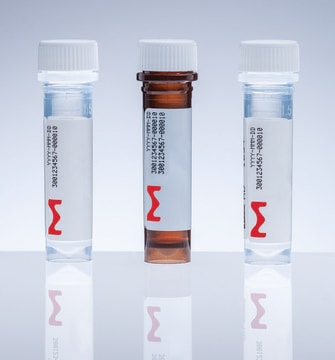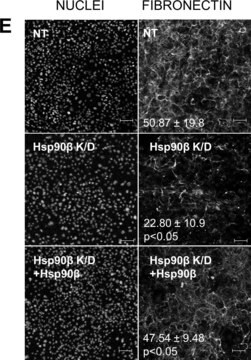EHU035581
MISSION® esiRNA
targeting human HDAC3
About This Item
Empfohlene Produkte
Beschreibung
Powered by Eupheria Biotech
Qualitätsniveau
Produktlinie
MISSION®
Form
lyophilized powder
esiRNA cDNA-Zielsequenz
GAGCTGACTCTCTGGGCTGTGATCGATTGGGCTGCTTTAACCTCAGCATCCGAGGGCATGGGGAATGCGTTGAATATGTCAAGAGCTTCAATATCCCTCTACTCGTGCTGGGTGGTGGTGGTTATACTGTCCGAAATGTTGCCCGCTGCTGGACATATGAGACATCGCTGCTGGTAGAAGAGGCCATTAGTGAGGAGCTTCCCTATAGTGAATACTTCGAGTACTTTGCCCCAGACTTCACACTTCATCCAGATGTCAGCACCCGCATCGAGAATCAGAACTCACGCCAGTATCTGGACCAGATCCGCCAGACAATCTTTGAAAACCTGAAGATGCTGAACCATGCACCTAGTGTCCAGATTCATGACGTGCCTGCAGACCTCCTGACCTATGACAGGACTGATGAGGCTG
Ensembl | Human Hinterlegungsnummer
NCBI-Hinterlegungsnummer
Versandbedingung
ambient
Lagertemp.
−20°C
Angaben zum Gen
human ... HDAC3(8841) , HDAC3(8841)
Allgemeine Beschreibung
For additional details as well as to view all available esiRNA options, please visit SigmaAldrich.com/esiRNA.
Rechtliche Hinweise
Lagerklassenschlüssel
10 - Combustible liquids
Flammpunkt (°F)
Not applicable
Flammpunkt (°C)
Not applicable
Hier finden Sie alle aktuellen Versionen:
Analysenzertifikate (COA)
Die passende Version wird nicht angezeigt?
Wenn Sie eine bestimmte Version benötigen, können Sie anhand der Lot- oder Chargennummer nach einem spezifischen Zertifikat suchen.
Besitzen Sie dieses Produkt bereits?
In der Dokumentenbibliothek finden Sie die Dokumentation zu den Produkten, die Sie kürzlich erworben haben.
Unser Team von Wissenschaftlern verfügt über Erfahrung in allen Forschungsbereichen einschließlich Life Science, Materialwissenschaften, chemischer Synthese, Chromatographie, Analytik und vielen mehr..
Setzen Sie sich mit dem technischen Dienst in Verbindung.






